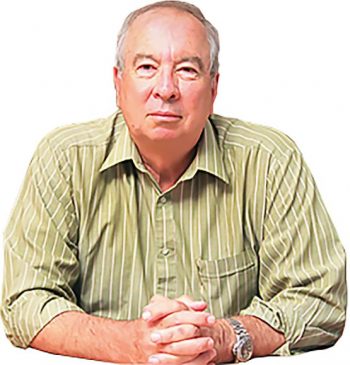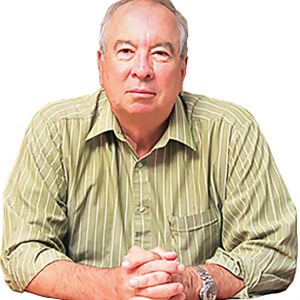
“Achieving a long and healthy life involves mitigating various risk factors that can accelerate the ageing process or lead to premature mortality,” writes CLIVE WILLIAMS.
“She said she was approaching 40 – I couldn’t help wondering from what direction.” –Bob Hope
Ageing is something we all have to adapt to but isn’t something we give much thought to until we get to middle age – ie, between 40 and 65 years of age.

Retirement usually gives more time for contemplation and thinking about how many years we have left – and how we want to live them.
A person’s age is typically measured in two ways: chronological age and biological age.
Chronological age refers to the time a person has lived, measured in years, whereas biological age denotes how old a person is based on various biomarkers and physiological attributes.
Chronological age is a useful, objective metric in many contexts, such as legal age limits and societal norms. However, chronological age does not reflect the significant variations in maturity, health, vitality and functional capacity among people of the same age group. They can exhibit vastly different levels of physical and mental health due to a range of influencing factors.
Biological age, on the other hand, aims to reflect the true functional state of the body. It is influenced by a myriad of factors, including genetics, lifestyle choices and environmental factors.
Biomarkers used to estimate biological age can include telomere length, DNA methylation patterns, levels of inflammatory markers, and organ system functionality.
Biological age provides a much more accurate picture of an individual’s health status and potential life expectancy than chronological age.
Achieving a long and healthy life involves mitigating various risk factors that can accelerate the ageing process or lead to premature mortality. These factors can be broadly categorised into genetic, lifestyle, and environmental influences.
Genetic factors
Family History: Genetics play a significant role in determining longevity. A family history of long-lived relatives can be indicative of inherited traits that promote longevity.
Genetic Disorders: Certain genetic conditions, such as progeria, can cause accelerated ageing, significantly reducing life expectancy.
Lifestyle factors
Diet: A balanced diet rich in fruits, vegetables, whole grains, and lean proteins can promote longevity. Diets high in processed foods, sugars, and unhealthy fats are associated with increased risk of chronic diseases such as heart disease, diabetes and obesity.
Exercise: Regular physical activity is essential for maintaining cardiovascular health, muscle mass, and overall physical function. Sedentary lifestyles and use of mobility scooters are linked to numerous health problems, including obesity and metabolic syndrome.
Smoking and alcohol consumption: Smoking is a major risk factor for various cancers, respiratory diseases, and cardiovascular conditions. Excessive alcohol consumption can lead to liver disease, cardiovascular problems, and other health issues.
Stress management: Chronic stress can contribute to the development of numerous health problems, including cardiovascular disease, depression, and anxiety. Effective stress management techniques, such as mindfulness, meditation and physical activity, can promote better health and longevity.
Environmental factors
Exposure to toxins: Environmental pollutants, such as air and water pollution, pesticides, and industrial chemicals, can accelerate aging and increase the risk of chronic diseases.
Socioeconomic status: Access to healthcare, nutritious food, and safe living conditions are heavily influenced by socioeconomic status. Individuals in lower socioeconomic brackets often have limited access to resources that promote health and longevity.
Healthcare access: Regular medical check-ups and early detection of diseases are crucial for maintaining health. People with limited access to healthcare are at a higher risk of succumbing to undiagnosed and untreated conditions.
Ageing is an inevitable part of life, but whether your biological age is below your chronological age and whether you remain healthy is largely down to personal lifestyle choices.
On a lighter note: ageing widower Tom and widow Juliet have been close friends for years. Finally, Tom realises that it would make sense for them to get married and spend their remaining time together.
So Tom takes her out to dinner and eventually pops the question: “Will you marry me?” Juliet is pleased that he has finally asked, and says, “Yes, of course”.
At the end of the evening, they part company and return to their respective homes.
The next morning Tom can’t remember whether he asked Juliet to marry him or not. Tom eventually plucks up the courage to phone Juliet and asks” “Did I ask you to marry me last night?”
“Yes” said Juliet “and I said yes – and meant it with all my heart.”
She continues: “I’m so glad you called because I couldn’t remember who’d asked me.”
And more: John Farnham visits a retirement home to entertain the residents and host a singalong – but nobody seems to recognise him. Puzzled, he takes an elderly lady aside and says, “Excuse me – but do you know who I am?”
“Sorry dear,” says the lady, “I don’t – but if you ask one of the nurses, I’m sure they’ll be able to tell you.”
Clive Williams is a Canberra columnist
Who can be trusted?
In a world of spin and confusion, there’s never been a more important time to support independent journalism in Canberra.
If you trust our work online and want to enforce the power of independent voices, I invite you to make a small contribution.
Every dollar of support is invested back into our journalism to help keep citynews.com.au strong and free.
Thank you,
Ian Meikle, editor





Leave a Reply